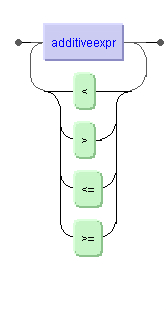Compare two values by using relational operators.

A RelationalExpr can be a simple AdditiveExpr
or two or more AdditiveExpr expressions that are operands to one
of the four relational operators < (less than),
> (greater than), <= (less than or equal), and
>= (greater than or equal). The comparison results in a Boolean
value "true" or
"false".
You can compare numeric values as well as string values, which are compared according to lexicographic ordering. If there is a collation defined for either of the operands or if both operands have the same collation defined, then the comparison is based on this collation, otherwise it is character-based.
It is compatible to the expression RelationalExpr defined
in XPath, Section
3.4, Rule 24. However, in XPath RelationalExpr is
restricted to comparison of numeric values.
In contrast to XSLT there is no need to use entity references for the
"<" and ">", since
the query string is not processed as an XML instance. But in XSLT a
RelationalExpr appears as an attribute value and must therefore be
referenced; the first example would look as follows: /patient/[born
< 1959].
Select the addresses of all patients whose surname is ordered before "Bl". The patient "Bloggs" is not in the result set, since "Bl" is positioned before "Bloggs" in the lexicographical order.
/patient/address[../name/surname < 'Bl']
Check if the mortality rate is below 10% (check if the number of
patient nodes multiplied by 10 is greater than the number of
deceased nodes)
count(/patient)*10 > count(//deceased)
BetweenExpr |
EqualityExpr |